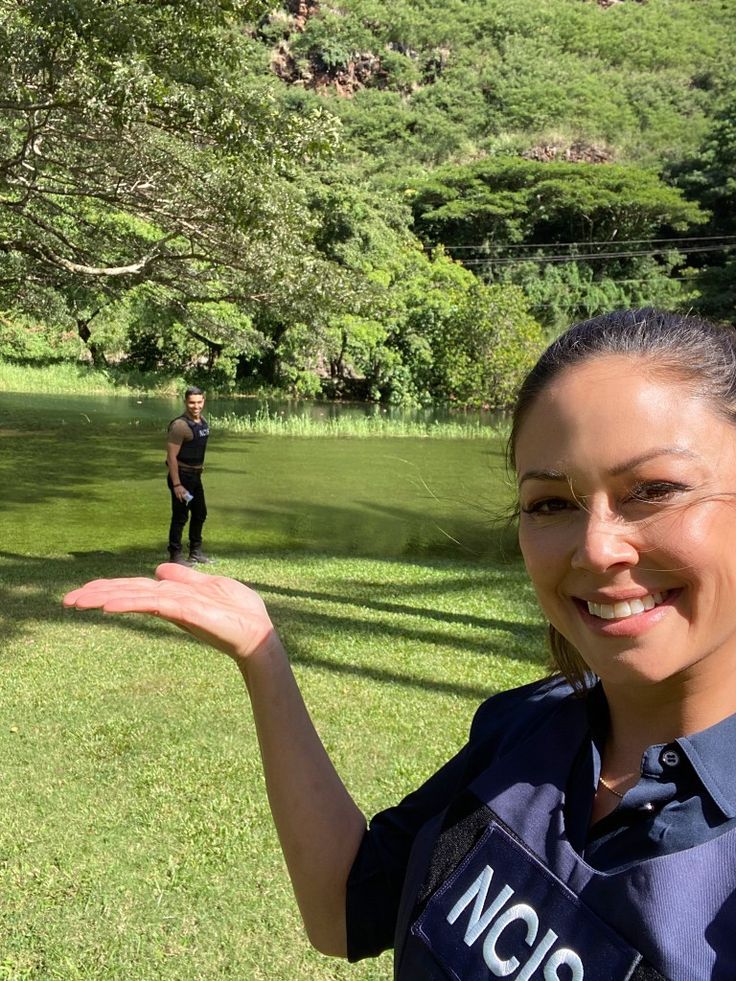
NCIS: Hawai’i was great for LGBTQ+ representation on primetime television, and now that it’s off the air, the absence of the spinoff will be a loss for the entire medium (not just the NCIS franchise). The spinoff featured a lesbian relationship between characters FBI Special Agent Kate Whistler (Tori Anderson) and NCIS Junior Agent Lucy Tara (Yasmine Al-Bustami), and the relationship wasn’t just an afterthought for the franchise. The two women have been in a healthy, loving relationship since the series started, with the relationship prominently featured in the pilot episode. The partnership was filled with moments that were tender and honest, adding depth to the LGBTQ+ experience typically seen in the media.
Unlike many representations of lesbian couples in the media, the relationship between Kate and Lucy (referred to as “Kacy”) was portrayed as genuine and non-sexualized. It was positively received within the LBGTQ+ community and accepted as an accurate representation of a lesbian relationship. The partnership was filled with moments that were tender and honest, adding depth to the LGBTQ+ experience typically seen in the media. It was a message that a relationship between two female federal agents warranted the same screentime as any other NCIS relationship before it.
The Aloha Spirit Met Real Representation
When we talk about meaningful representation in media, especially on network television, NCIS: Hawai‘i deserves a standing ovation. Amidst crime-solving, ocean views, and Navy intel, this NCIS spin-off carved out space for something that most shows still struggle with — authentic LGBTQ+ representation.
While the show may have flown under the radar for some viewers, its commitment to diversity, inclusion, and accurate portrayals of LGBTQ+ relationships is worth celebrating. Let’s dive deep into why NCIS: Hawai‘i was more than just another procedural drama — it was a cultural touchstone.
The Groundbreaking LGBTQ+ Visibility on Primetime TV
The Power of Visibility on CBS
CBS hasn’t always been known for pushing boundaries in queer representation. That’s why NCIS: Hawai‘i was such a breath of fresh, island air. It boldly placed LGBTQ+ characters in the forefront, not as side notes or background filler, but as leading roles with full emotional arcs.
Special Agent Lucy Tara & Kate Whistler: A Love Story That Mattered
From Flirtation to Foundation
Lucy Tara (played by Yasmine Al-Bustami) and Kate Whistler (played by Tori Anderson) weren’t just an add-on couple. Their relationship was central to the narrative — messy, real, tender, and powerful. From their early flirtations to navigating career-driven conflicts, fans saw their journey unfold with authenticity.
Representation With Depth, Not Tokenism
What made this pairing stand out? It wasn’t just about showing a queer couple. It was about treating their story with the same care and nuance any heterosexual couple would receive. They argued. They made up. They kissed. They cried. And they did it all on network television, not just a streaming service.
Why This Matters in the Bigger TV Landscape
LGBTQ+ Characters Are Often Side-Lined
Let’s be honest. Too often, LGBTQ+ characters are thrown into shows as afterthoughts. They’re one-dimensional, there to fill a quota. But NCIS: Hawai‘i said, “Nah, we’re doing this differently.”
Visibility Translates Into Validation
For many viewers, especially queer teens and young adults, seeing themselves on-screen isn’t just entertainment — it’s affirmation. Lucy and Kate’s relationship told viewers, “You belong. Your story matters. You deserve love.”
A Refreshing Island Vibe With Real World Relevance
Hawai‘i as More Than a Backdrop
The tropical setting wasn’t just eye candy. It symbolized diversity, inclusion, and a culture deeply rooted in ohana — family. That spirit extended to the cast and their stories, reinforcing the idea that love in all its forms is something to be embraced.
Casting With Intention
NCIS: Hawai‘i went out of its way to include not only LGBTQ+ characters but also actors of color and underrepresented communities. The ensemble was a reflection of real-world diversity — something rare and refreshing on primetime.
The Cancellation That Hit Hard
A Show That Still Had So Much To Say
When NCIS: Hawai‘i was canceled after just three seasons, fans weren’t just disappointed — they were devastated. Not because it was another crime show gone, but because it was one of the very few network shows consistently delivering inclusive storytelling.
The Fan Response Was Loud and Proud
Social media exploded with hashtags like #SaveNCISHawaii and #LGBTQRepresentationMatters. Fans flooded Twitter and Instagram with appreciation posts, fan edits, and passionate pleas for another network to pick up the show.
Impact Beyond The Screen
A Cultural Shift in Primetime TV
This wasn’t just about one couple. NCIS: Hawai‘i was part of a larger movement pushing for diversity in entertainment. It proved that inclusive storytelling is not only possible — it’s profitable and popular.
Fan Art, Fan Fiction, and Fandom Love
If you’ve spent any time in online fandom spaces, you’ll know that Lucy and Kate’s love story inspired an avalanche of fan content. From artwork to Tumblr threads, the ripple effect was huge.
Storylines That Tackled Real LGBTQ+ Issues
Queer Identity in the Workplace
Kate struggled with balancing her high-profile job with her personal identity. Sound familiar? It should — because that’s a real dilemma for many queer professionals.
Love Amidst High Stakes
Their romance didn’t exist in a vacuum. It was woven into the high-stakes world of espionage, law enforcement, and military structures — traditionally hyper-masculine environments not known for queer inclusivity.
Conversations That Started Because of This Show
Normalizing Queer Relationships
By showcasing a queer relationship without fanfare — just love as love — the show helped normalize what should have been normalized long ago.
Pushing The Needle On Network Expectations
NCIS: Hawai‘i challenged CBS and other networks to do better, and audiences noticed. It raised the bar and inspired conversations in homes, classrooms, and boardrooms.
The Power of Authentic Performances
Actors Who Understood the Assignment
Yasmine Al-Bustami and Tori Anderson didn’t just play a couple — they became a couple in fans’ eyes because of the emotional depth and honesty they brought to every scene.
Chemistry That Leapt Off The Screen
You can’t fake chemistry, and these two had it in abundance. Their dynamic was one of the most-beloved on TV, queer or otherwise.
What Other Shows Can Learn from NCIS: Hawai‘i
Stop Playing It Safe
Diversity isn’t a risk — it’s a necessity. Audiences crave representation that reflects the real world, and NCIS: Hawai‘i delivered.

Tell LGBTQ+ Stories With Integrity
It’s not enough to cast a queer character. Their stories must be layered, respectful, and meaningful — not cliché-ridden side plots.
The Legacy Lives On
Reruns, Streaming, and Still Making Waves
Even post-cancellation, NCIS: Hawai‘i continues to trend on social platforms. Its LGBTQ+ representation left an imprint that continues to grow.
Fans Are Keeping the Spirit Alive
Fan campaigns are still active. Petitions, rewatches, and community events keep the love alive — and remind execs that representation isn’t negotiable.
Conclusion: A Show That Gave Us More Than Crime-Solving
At its heart, NCIS: Hawai‘i wasn’t just about solving Navy crimes in paradise. It was about love, identity, and showing that representation matters. From Lucy and Kate’s relationship to the inclusive cast and bold storytelling, this series quietly redefined what primetime TV could look like — and what it should look like. Its cancellation left a void, but its impact? That’s forever.